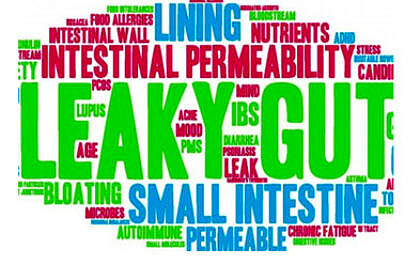What is Leaky Gut?

In simple terms, the digestive system works as follows: we eat (good diet or bad diet), digest (complete or incomplete), then we eliminate (good evacuation or bad evacuation) or assimilate (good absorption or poor absorption). The gut is commonly referred to as the “Second Brain” because the enteric nervous system is a collection of neurons in the gastrointestinal tract (GI) that constitutes the “brain of the gut” and can function independently of the nervous system. This system controls the motility, exocrine and endocrine secretions and microcirculation of the GI tract. It is also involved in regulating immune and inflammatory processes. Hippocrates has also said that all disease begins in the gut. About 70 to 80 percent of the body’s immune system is found in the digestive tract.
Poor digestive health that involves acid reflux, bloating, irritable bowel syndrome (IBS) or constipation is an extremely common and overlooked condition in this country that affects about 70 million Americans. This accounts for billions of dollars in annual sales of over-the-counter digestive aids that only provide temporary relief. Unresolved or ignored digestive problems lead to worse problems down the road. With any health condition, it is important to restore gut health.
Poor gut health leads to blood sugar problems, and that leads to constipation. With constipation, the body cannot eliminate unneeded hormones and estrogen accumulates. Food not digested properly due to lack of hydrochloric acid (HCL) results in putrefied, fermented food that becomes rancid in the stomach. Low HCL results in the gallbladder’s reduced ability to secrete bile for the emulsification of fats. Low gallbladder function causes a sluggish liver, and it cannot efficiently detoxify the body of hormones, toxins and other metabolites. When the gallbladder malfunctions, there is no signal to the pancreas to secrete digestive enzymes. Therefore poorly digested food moves to the intestines. Rotting food in the intestines causes inflammation, infection and intestinal permeability, also known as “leaky gut.” This prolonged stress exhausts the adrenals, and weak adrenals adversely affect the thyroid. This progression continues until the underlying problem is corrected.
A healthy GI tract does not allow the absorption of bacteria, harmful foods or undigested food particles into the bloodstream. Chronic inflammation brought on by poor diet, poor blood sugar control and chronic stress leads to harmful substances and undigested food being dumped into the bloodstream. Again, this is leaky gut. These harmful particles are misidentified as foreign invaders or antigens that are attacked by the immune system. A stressed immune system leads to other health problems.
The proper care of the gut requires the supervision of a qualified healthcare professional. To repair the gut, the first step is the elimination of foods that create chronic immune responses. These are most commonly gluten, dairy, eggs, corn, soy and yeast.
A healthcare professional could help determine which foods to remove from the diet. Other nutritional strategies include: the removal of inappropriate organisms such as bacteria, parasites, fungus and yeast; replacement of digestive enzymes, HCL, bile and fiber, to thoroughly digest proteins, fats and essential nutrients; re-populate with ample probiotics to replace an overabundance of bad bacteria with good bacteria; and supporting regeneration and healing of the gastrointestinal mucosa.
The repair of a broken down gut is not easy and it takes time. But it is well worth the effort. It is important to restore gut function. Other body organs may still need evaluation, such as the liver, thyroid and adrenals, but many of these issues cannot be resolved until the gut is first examined.
Do you have digestive issues? Let’s talk about it! Go to http://AskDrLeona.com to schedule your free 30-minute Breakthrough Call!
I hope you found this information useful and I would love to hear your comments!




